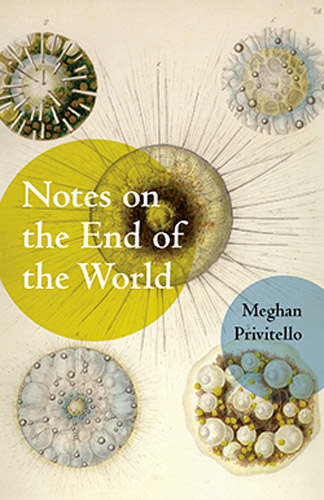Notes on the End of the World
Meghan Privitello is the recipient of a 2014 New Jersey State Council of the Arts Fellowship in Poetry and she is the author of the full-length poetry collection: A New Language for Falling Out of Love (YesYes Books, 2015). Her latest release, Notes on the End of the World, is the winner of the Black River Chapbook Competition and it is an intoxicating work of art that will leave you swooning and word-drunk after you have read it. Despite being 47 pages in length, this chapbook has all the aesthetic weight of a poetry collection double its size. The book contains 20 poems sequentially titled “Day I” through “Day 20” and they are bracketed by two other poems with the same title: “Notes on the End of the World.”
Meghan Privitello is the recipient of a 2014 New Jersey State Council of the Arts Fellowship in Poetry and she is the author of the full-length poetry collection: A New Language for Falling Out of Love (YesYes Books, 2015). Her latest release, Notes on the End of the World, is the winner of the Black River Chapbook Competition and it is an intoxicating work of art that will leave you swooning and word-drunk after you have read it. Despite being 47 pages in length, this chapbook has all the aesthetic weight of a poetry collection double its size. The book contains 20 poems sequentially titled “Day I” through “Day 20” and they are bracketed by two other poems with the same title: “Notes on the End of the World.”
The coming apocalypse has seldom felt so sexy and beguiling as Privitello makes it out to be in her fierce and fearless poems, many of which read like hallucinatory diary entries in well-crafted verse. In the poem “Day 13” she states: “I can’t tell whether I’m an outlaw or a wife.” She seems to be both in fact, proclaiming in the same poem that when she comes home, her husband says: “I think I married a witch.” In “Day 9” we learn that our poet/persona is “in love with whiskey and faulty hearts” and in the poem “Day 6” we get this candid admission: “I sleep with a pistol between my legs so often / that any man would be a soft nuisance.” Ha! The entire chapbook is littered with great one liners like those quoted above, but part of the charm of Privitello’s linguistic sorcery is watching her poems unfold themselves rhythmically at length on the page, as in “Day 15”:
I should have known the world was ending
when the carnival never left town.Clowns and sword swallowers lay down,
made dirt angels and hoped their magic
would sprout them wings.
What a trick hovering would be.
How much quicker you can escape what you fear
when you have no allegiance to the ground.
Later in the same poem she makes the ontological observation that: “The funhouse distorts nothing. / We are that contorted. / That backward / and forward.” And Privitello goes through many distortions and contortions in her book: communing with a coyote, becoming “part mountain, / part ocean” and even turning theologian in the poem “Day 7” when she inquires:
Haven’t you heard?
Our god is diabetic.
Arthritic.
Hypoallergenic.Give god a reason, he’ll break out in hives.
Privitello makes numerous interesting leaps in logic, metaphor, and meaning in the course of a single poem. It’s fascinating to watch her flow of thought as in this excerpt from the final poem in the book:
I’ve pushed a shopping cart in the dark for days.
I don’t know, anymore, what a day is.
My ankles are swollen like my mother’s when she ate ham.
I’ve asked my husband to drain the water from my body
and make a small lake in my name.
I will put my germs in it.
They will build a home there.
This is either how it begins or how it ends.
Angels, this is your last chance.
You can choose to touch us one last time
and convince us we have always been holy.
There is such a nice cadence in these poems! In the poem quoted above the author flirts with iambic pentameter without ever committing to it and we also see a deft use of internal rhyme in several places: “cart in the dark” and “make a small lake.” And while the tone she uses in this collection is mostly conversational, she has written true poems my friends, not just prosaic free verse “notes” on impending doom and destruction. The sometimes pessimistic subject matter is also mitigated by the playfulness of Privitello’s language, which I consistently found to be winsome and charming. Even when her poems are fractured by anxiety and an almost stream of consciousness type of reflection, she manages to always re-center our attention in the pure pleasure of the possibilities she has imagined on the page. As she writes in the first poem of the book: “I could almost believe the world planned for itself to fail.” That “almost” is important. It holds out a kind of hopeless hope that is beyond both optimism and despair. I cannot imagine someone not finding this book a treasured addition to their poetry bookshelf.





